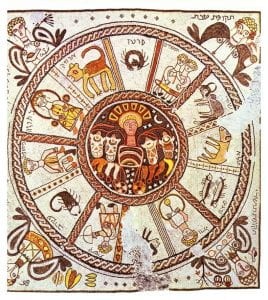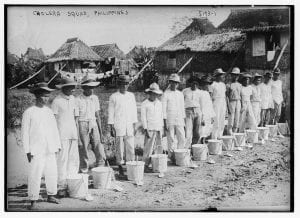In this article, Maria Kang discusses how traditional values and expectations of women prevailed despite popular media portraying the 1920s as an era of radical social change for women.
Latest News
The Rising Blade that Pierces the Setting Sun: The Fall of Japan’s Imperial Aristocracy and the Rise of the Samurai
In this article, Sebastian Rosa examines the factors that caused the fall of the Japanese Imperial Court’s political authority and how the central government’s declining power led to the rise of the samurai in Japanese government and society in the twelfth century.
Constellations of Identities: Synagogue Mosaics and their Implications
Roy Harel’s research article analyzes how synagogue zodiac mosaics, John Chrysostom’s polemical sermons, and late antique Near Eastern material culture reveal the fluidity of cultural association and identity of the Bet Alpha Jewish community as well as the extent of group differentiation in the Near East.
Drummer Boys: A Myth and A Worker
Alexander Bergeret’s research article examines how stories surrounding drummer boys fighting on the battlefield in the American Civil War overshadowed the typical duties and tasks expected to be completed by drummer boys.
Women, War, and Work: An Analysis of German and American Propaganda during the Second World War
In this article, Juliet Romano analyzes the similarities between American and German propaganda aimed towards women during World War II. The propaganda posters illustrate how cultural differences between the roles of German and American women were wiped away during the war.
A War on Two Fronts
In this paper, Jan Jandayran discusses how the 1902 Cholera Epidemic was not a result of the Philippine-American War, but rather as an epidemic that occurred in conjunction with the war. The relationship between cholera, American anti-guerilla policies, and the Filipino reaction to American epidemic policies are examined in this article.
The Lessons of Kingship: The Tale of Beowulf to King Alfred of Wessex
This paper analyzes whether the qualities of a good king are parallel between King Alfred and the epic poem Beowulf. The Anglo-Saxon ideals of kingship are explored through the dialogue between the historical sources about King Alfred’s life and the Old English epic Beowulf.
McGann v. H & H Music Company and HIV/AIDS Workplace Visibility in the Legal Setting
This paper is a legal brief on the cases of John McGann against H & H Music Co. that examines how McGann’s fight to have his medical expenses covered after his HIV diagnosis reflected the struggles of those around the country who experienced similar discrimination during the beginning of the AIDS epidemic.
Chocolate Pudding and Space Aliens: How the Heaven’s Gate Cult Propagated
Heaven’s Gate was a cult founded in the 1970s. In this paper Michael Corcoran analyzes the rhetoric the leaders used by examining three tapes that were produced in the final two years of the cult. These tapes reveal how Heaven’s Gate used social isolation to reinforce their indoctrination, which effectively reinforced the beliefs of the cult. These processes led to the death of the members of Heaven’s Gate, the largest mass suicide on U.S. soil in history.
“We don’t want your rations. We want this dance:” Native American Dance and The Battleground for Native Identity
Dance is a central aspect of Native American culture. Thus, it is no surprise the U.S. government explicitly attempted to erase these practices. However, Native resistance preserved these dances, and today they serve as both a means of preserving tradition while expressing and celebrating Native identity.









